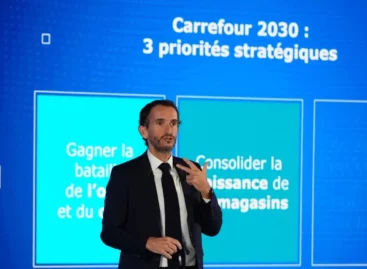In the age of AI, STEM professions are also future-proof
Seven out of ten women would not choose a technical and technological career, and the use of artificial intelligence should be learned at school – this is revealed by a nationally representative survey by CETIN Hungary. According to the research, in addition to technological knowledge, human skills are also increasingly important in personal development. To develop these, the company is launching the STEMpowered by CETIN program for the third time, together with the Women in Science Association (NaTE), which helps high school girls get closer to the world of technology.
 There are still too few women in technical and technological fields, even though the digital economy requires a diverse approach and thus creative problem solving. According to a recent national survey by CETIN Hungary, 71 percent of women surveyed do not plan to work in a technical, technological or IT career at all, while this rate is 41 percent for men. According to the survey, women’s career choices are primarily determined not by interest, but by the environment:
There are still too few women in technical and technological fields, even though the digital economy requires a diverse approach and thus creative problem solving. According to a recent national survey by CETIN Hungary, 71 percent of women surveyed do not plan to work in a technical, technological or IT career at all, while this rate is 41 percent for men. According to the survey, women’s career choices are primarily determined not by interest, but by the environment:
- 37% of them say that schools do not pay enough attention to getting girls interested in technology,
- three out of ten Hungarians say that peer pressure is a holding back,
- while a quarter of respondents say that their family and circle of friends consider these to be men’s professions.
The survey also revealed that the rapid rise of artificial intelligence is fundamentally changing the world of work, yet the majority of Hungarians are only just getting acquainted with the tool. 45 percent of respondents indicated their knowledge of using AI as basic, 16 percent as beginner, and only 3 percent reported having advanced knowledge. However, artificial intelligence is quickly becoming a part of everyday life, and the majority has already recognized that this knowledge will be essential in the future: according to nearly 70 percent of those surveyed, learning how to use AI should start at school.
However, the future is not only shaped by technological skills, but also by human skills. This is indicated by the results of the survey, according to which most people consider communication skills (49%), problem-solving and project-based approach (38%), mental health and self-knowledge (38%), and career awareness (31%) to be the most important for personal development.
The STEMpowered by CETIN program, launched by CETIN and NaTE, focuses on these areas, and for the third year now, it has been supporting high school girls free of charge in getting closer to technology and engineering careers. The program is based on experiential and discovery-based learning: participants work in teams to solve real problems and learn how to use technology creatively and responsibly. The first element of this year’s program is a Hackathon, where students develop innovative ideas related to, for example, smart cities, 5G solutions or cybersecurity challenges. The best performing girls from here are selected for a development program lasting several months, which also offers workshops, institutional visits, career discussions and team building opportunities. CETIN’s experienced professionals help girls find their own strengths, think more boldly about their future, and get a realistic picture of the diverse opportunities of STEM careers.
“The program not only helps with career orientation, but also in developing self-awareness, communication, creativity, and cooperation. These are the skills that, according to our research, young people also consider to be key in the workplace of the future. Based on last year’s experiences, the participating girls have developed spectacularly in these areas – they plan their future more confidently, consciously, and courageously,”
– said Judit Kübler-Andrási, CEO of CETIN.
The survey also asked what, in light of the advancement of artificial intelligence, professions are considered the most future-proof by Hungarians. According to 43% of the population, the work of representatives of STEM professions such as engineers, IT specialists, AI developers and cybersecurity experts will be irreplaceable in the future. In the case of doctors and veterinarians, also belonging to the STEM field, this proportion is 42%. According to the respondents, the ranking is led by manual jobs (such as carpenters, electricians) and personal services (such as hairdressers), the former by 47%, while the latter by 46%. Those surveyed consider driving (16%) and administrative jobs (9%) to be the least future-proof.
Related news
PwC Global CEO Survey: CEO confidence at a five-year low
🎧 Hallgasd a cikket: Lejátszás Szünet Folytatás Leállítás Nyelv: Auto…
Read more >Related news
Nestlé to sell remaining ice-cream assets but commits to Froneri venture
🎧 Hallgasd a cikket: Lejátszás Szünet Folytatás Leállítás Nyelv: Auto…
Read more >









